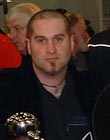|
|
This topic comprises 2 pages: 1 2
|
|
Author
|
Topic: Where do you get trainging to be a projection engineer?
|
|
|
Ken McFall
Jedi Master Film Handler

Posts: 615
From: Haringey, London.
Registered: Apr 2001
|
 posted 09-08-2002 01:05 PM
posted 09-08-2002 01:05 PM




Well the first thing is be a GREAT projectionist, nothing beats hands on experience EVER! Most of the 'real' engineers I've known have all been projectionists so they know not only how the equipment works but how it's used. When you leave the booth after a repair its the guys who run the show's that have to cope .... respect for them will go a long way when you need support and help.Much of the electronic equipment used today is not site repairable so a good working knowledge of the equipment is needed so you can isolate the defective board and replace as required. Panicing and replacing everything in sight may resolve the fault but all you end up with is a pile of suspect boards!! Possibly the one skill that will win you more support and respect is being able to admit 'Sorry I don't know what the problem is' bullshit is a sure way to earn a reputaion and no support. Asking for help is no disgrace...... there is a lot of very valuable experience in projection rooms and only a fool would ignore it as a resource. There is the other option which seems to be favoured by many of the circuits today.... suck up and kiss ass!! It's not what you know it's who you know. It'll get you there faster than s**t down a drain but you can bet it won't be a pleasant stay. You've started well by asking the guys who know what's going on in the real world. Keep that in mind and one day they'll be asking you for advice and help. Good luck. Regards Ken.
| IP: Logged
|
|
|
|
|
|
|
|
|
|
Tim Reed
Better Projection Pays

Posts: 5246
From: Northampton, PA
Registered: Sep 1999
|
 posted 09-08-2002 06:12 PM
posted 09-08-2002 06:12 PM




quote:
I'd have to know everything about everythig there is to know about projectors and such
Tim, it's like anything else, you gotta like what you do. That will fuel the desire to learn. Best thing to do: read. Voraciously. Read every projection equipment operation and service manual you can lay your hands on. That's a good deal of it, you'd be surprised what's "in the books". But, to build a proper foundation, you should learn some basic electronics (with lab) - learning to read schematic and wiring diagrams, et.al, will help you understand how things work, which guides you in troubleshooting. Learning about digital logic is also a plus. Keeping a cool head under pressure is a good attribute to have, so just stay loose, none of it is rocket science. Most helpful of all is the ability to work well with people. And, as Ken notes, it's no biggie to step back and say "well, son of a gun, I've never seen that happen before!" In most any outfit you work for, there will always be someone you can call for advice, if you get in over your head. Good luck! ------------------
Better Projection Pays!
| IP: Logged
|
|
Ken Lackner
Phenomenal Film Handler

Posts: 1907
From: Atlanta, GA, USA
Registered: Sep 2001
|
 posted 09-08-2002 08:09 PM
posted 09-08-2002 08:09 PM




Hmmmm....I was in the same boat about a year and a half ago. "Just how do I learn to become a projection tech?" Well, one thing I started doing as often as I could was follow my tech around and learn the things he does, both at my theater and others that he services. If you can make friends with your tech, it will certainly help. The best knowledge really comes from hands on work. (Unfortunately, some techs are not people persons, and do not like to teach. If that's the way your tech is, you're out of luck in that department.)As Tim R. and Gordon have mentioned, a background in electronics is very helpful. That's why I'm getting an A.S. in Electronic Engineering Technology. I've seen job requirements for some service tech positions that say "Associate degree in electronics or equivalent electronics experience." If you've already got the knowledge and experience in that area, great! If not, start looking around at community colleges that offer such a degree. Also, get a book of basic electronics theory from your local bookstore. Learning how to read schematic diagrams and to logically troubleshoot systems are critical skills. And, as others have said, go to Dolby School and any other training seminars that you can. Kodak and other companies provide various levels of projection training. I'm sure John P. can provide more info on that.
| IP: Logged
|
|
|
|
|
|
|
|
Tim Turner
Film Handler

Posts: 87
From: Chula Vista, CA, USA
Registered: Jan 2002
|
 posted 09-11-2002 12:30 PM
posted 09-11-2002 12:30 PM




I also heard it was 10%, but you got some really dumb people out there. Anyone dealing with customers at movie theaters know that.Case 1:
"Huh, excuse me, can you tell me when the 8:00 showing of Bloodworks starts?" Case 2:
Usher: "Ok this will be in the theater 5, 3rd one on the left"
Customer: "Oh, ok thank you" 20 min later Customer: "This movie was supposed to start 20 mins ao! This is very unprofessional"
Usher: "Well it did start 20 mins ago, theater number 5 third one on the left, you went into number 7 fourth one on the right."
| IP: Logged
|
|
Paul G. Thompson
The Weenie Man

Posts: 4718
From: Mount Vernon WA USA
Registered: Nov 2000
|
 posted 09-11-2002 12:34 PM
posted 09-11-2002 12:34 PM




Tim, in addition to the above comments, I'll give you my 2 cents worth.....it is basically this:Plenty of hands-on training experience, lots of common sense, the ability to understand what your machines are supposed to be doing and how they do it, and really liking what you are doing! Until John chimed in, I thought there was no school that teaches this stuff. If you are thinking about being the "Man" to go to theatres as a tech and making a living at it, you learn it by "Hard Knocks" and screwing up, and learning from your mistakes.  If so, one thing that will really help....finding someone who has been in the field for a while that is willing to take the time, effort, and a little expense on their part to ship or provide you with good junk to play with so that you can gain this experience. However, be advised that once this stuff gets into your blood, you have been "had" and there is no way out. 
| IP: Logged
|
|
Pete Naples
Phenomenal Film Handler

Posts: 1565
From: Dunfermline, Scotland
Registered: Feb 2001
|
 posted 09-11-2002 12:45 PM
posted 09-11-2002 12:45 PM




My way in was not unsual.Studied things like Physics, Tech Drawing, Mechanics, Electronics etc at High School (Neve been in a booth at this point) Had a part time job in the booth at my local cinema, got really interested in it all, worked around a few different comapnies, learning different equipment and modus operandi, all the while reading, and sticking to the visiting engineer (it always seemed to be the same guy wherever I worked!) Badgered said guy to get me a job for years, which eventually paid off. Even now I'm always learning, from equipment manuals, colleagues, courses by Dolby etc.
| IP: Logged
|
|
|
|
|
|
All times are Central (GMT -6:00)
|
This topic comprises 2 pages: 1 2
|
Powered by Infopop Corporation
UBB.classicTM
6.3.1.2
The Film-Tech Forums are designed for various members related to the cinema industry to express their opinions, viewpoints and testimonials on various products, services and events based upon speculation, personal knowledge and factual information through use, therefore all views represented here allow no liability upon the publishers of this web site and the owners of said views assume no liability for any ill will resulting from these postings. The posts made here are for educational as well as entertainment purposes and as such anyone viewing this portion of the website must accept these views as statements of the author of that opinion
and agrees to release the authors from any and all liability.
|

 Home
Home
 Products
Products
 Store
Store
 Forum
Forum
 Warehouse
Warehouse
 Contact Us
Contact Us




 Printer-friendly view of this topic
Printer-friendly view of this topic





















